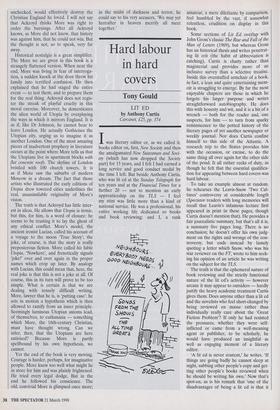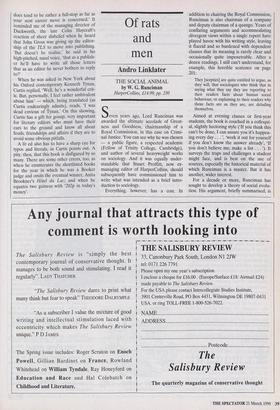Hard labour in hard covers
Tony Gould
LIT ED by Anthony Curtis Carcanet, £25, pp. 374 Iwas literary editor or, as we called it, books editor on, first, New Society and then the amalgamated New Statesman and Soci- ety (which has now dropped the Society part) for 15 years, and I felt I had earned a long service and good conduct medal by the time I left. But beside Anthony Curtis, who was lit ed at the Sunday Telegraph for ten years and at the Financial Times for a further 20 — not to mention an early apprenticeship on the TLS — I feel my stint was little more than a kind of national service. He was a professional, his entire working life dedicated to books and book reviewing; and I, a rank amateur, a mere dilettante by comparison, feel humbled by the vast, if somewhat relentless, erudition on display in this book.
Some sections of Lit Ed overlap with John Gross's classic The Rise and Fall of the Man of Letters (1969), but whereas Gross has an historical thesis and writes penetrat- ing lit crit (the habit of abbreviation is catching), Curtis is chatty rather than magisterial and provides more of an inclusive survey than a selective treatise. Inside this overstuffed armchair of a book, in fact, a lean and quite entertaining mem- oir is struggling to emerge. By far the most enjoyable chapters are those in which he forgets his larger purpose and writes straightforward autobiography. He does this with honesty and wit, and it is a bit of a wrench — both for the reader and, one suspects, for him — to turn from sparky reminiscence to the potted history of the literary pages of yet another newspaper or weekly journal. Nor does Curtis confine himself to this side of the Atlantic. A research trip to the States provides him with the occasion, or excuse, to do the same thing all over again for the other side of the pond. It all rather reeks of duty, as though he felt that the essential qualifica- tion for appearing between hard covers was hard labour.
To take an example almost at random, he rehearses the Leavis-Snow 'Two Cul- tures' controversy at considerable length (Spectator readers with long memories will recall that Leavis's infamous lecture first appeared in print in these pages, though Curtis doesn't mention that). He provides a fair journalistic summary, but that's all it is, a summary five pages long. There is no conclusion; he doesn't offer his own judg- ment on the rights and wrongs of the con- troversy, but ends instead by lamely quoting a letter which Snow, who was his star reviewer on the FT, wrote to him seek- ing his opinion of an article he was writing on the subject for the TLS.
The truth is that the ephemeral nature of book reviewing and the strictly functional nature of the lit ed's activity — however arcane it may appear to outsiders — hardly justify the heavy academic treatment Curtis gives them. Does anyone other than a lit ed and the novelists who feel short-changed by being reviewed en masse rather than individually really care about the 'Great Fiction Problem'? If only he had resisted the pressures, whether they were self- inflicted or came from a well-meaning agent or publisher, to be scholarly, he would have produced an insightful as well as engaging memoir of a literary editor.
`A lit ed is never content,' he writes. 'If things are going badly he cannot sleep at night, subbing other people's copy and get- ting other people's books reviewed when he should be writing his own.' Now that's spot-on, as is his remark that 'one of the disadvantages of being a lit ed is that it does tend to be rather a full-stop as far as your next career move is concerned.' It reminded me of the managing director of Duckworth, the late Colin Haycraft's reaction of sheer disbelief when he heard that John Gross was giving up the editor- ship of the TLS to move into publishing. `But doesn't he realise,' he said in his high-pitched, nasal voice, 'that as a publish- er he'll have to write all those letters that as an editor he never bothers to reply to?'
When he was asked in New York about his Oxford contemporary Kenneth Tynan, Curtis replied, 'Well, he's a wonderful crit- ic. But, personally, I feel rather ambivalent about him' — which, being translated (as Curtis endearingly admits), reads, 'I was dead envious of Tynan.' On this showing, Curtis has a gift for gossip, very important for literary editors who must have their ears to the ground and know all about feuds, friendships and affairs if they are to avoid some obvious pitfalls. A lit ed also has to have a sharp eye for typos and literals, as Curtis points out. A pity, then, that this book is disfigured by so many. There are some other errors, too, as when he enumerates the shortlisted books for the year in which he was a Booker judge and omits the eventual winner, Anita Brookner's Hotel du Lae; and when he equates two guineas with '202p in today's money'.





































































 Previous page
Previous page